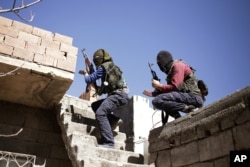A video produced by the PKK Kurdish rebel group appears to show a carefully executed ambush of a Turkish attack helicopter.
The authenticity of the video has not been confirmed. The army contends that the helicopter crashed because of technical reasons.
But retired Turkish brigadier Haldun Solmazturk said such an attack would have far reaching consequences.
"It is extremely significant from a military perspective," he said. "This fact would change tactics of the overall approach, the balance of power between PKK and Turkish army, and it would have an effect on the morale of the Turkish soldiers."
Adding to Turkish military concerns is the apparent failure of the helicopter’s defense system, said analyst Metehan Demir, a former Turkish military pilot.
"The downed helicopter was not alone during the operation," Demir said. "There was another helicopter just behind the helicopter, and this helicopter was not warned by the defense system that the missile was coming. This is also very strange, which means it looks like the system was very new used by the PKK, and there could be more similar missiles in the hands of the PKK."
Analysts said the missile used in the attack appeared to be Russian-made, but it remained unclear how the PKK obtained it and how many the group has.
Decades of combat
The PKK has been fighting the Turkish state for greater minority rights for more than three decades. Fighting resumed last year after a collapse in peace talks.
Solmazturk, who fought the PKK throughout the 1990s, said the helicopter downing would undermine the Turkish army’s war against the rebels.
"In principle, it's a game-changer," he said. "Army operations are mainly based on tactical air support, and the only available air asset in the inventory of the Turkish army is attack helicopters. And even they are in very limited numbers. So the presence of anti-aircraft missiles would very adversely affect the Turkish army's anti-terror operations."
Analysts said the army relies mainly on eight or nine twin-engined Super Cobra helicopters, one of which was shot down, and may have 30 single-engine Cobras, which are nearly obsolete.
Analyst Demir said the army would now have to adopt riskier tactics.
"Turkey will divert its operations from air to land," he said, but the PKK has known the area "very well for many decades" and has planted explosive devices "even in the caves in the area. ... Therefore, Turkey has to be very careful on its ground operations."
Observers warned that the prospect of curtailed helicopter use would most likely spur the PKK to step up its operations, which will add to the pressures on the military that is fighting in the countryside and in costly street-to-street warfare in the predominantly Kurdish southeast.





